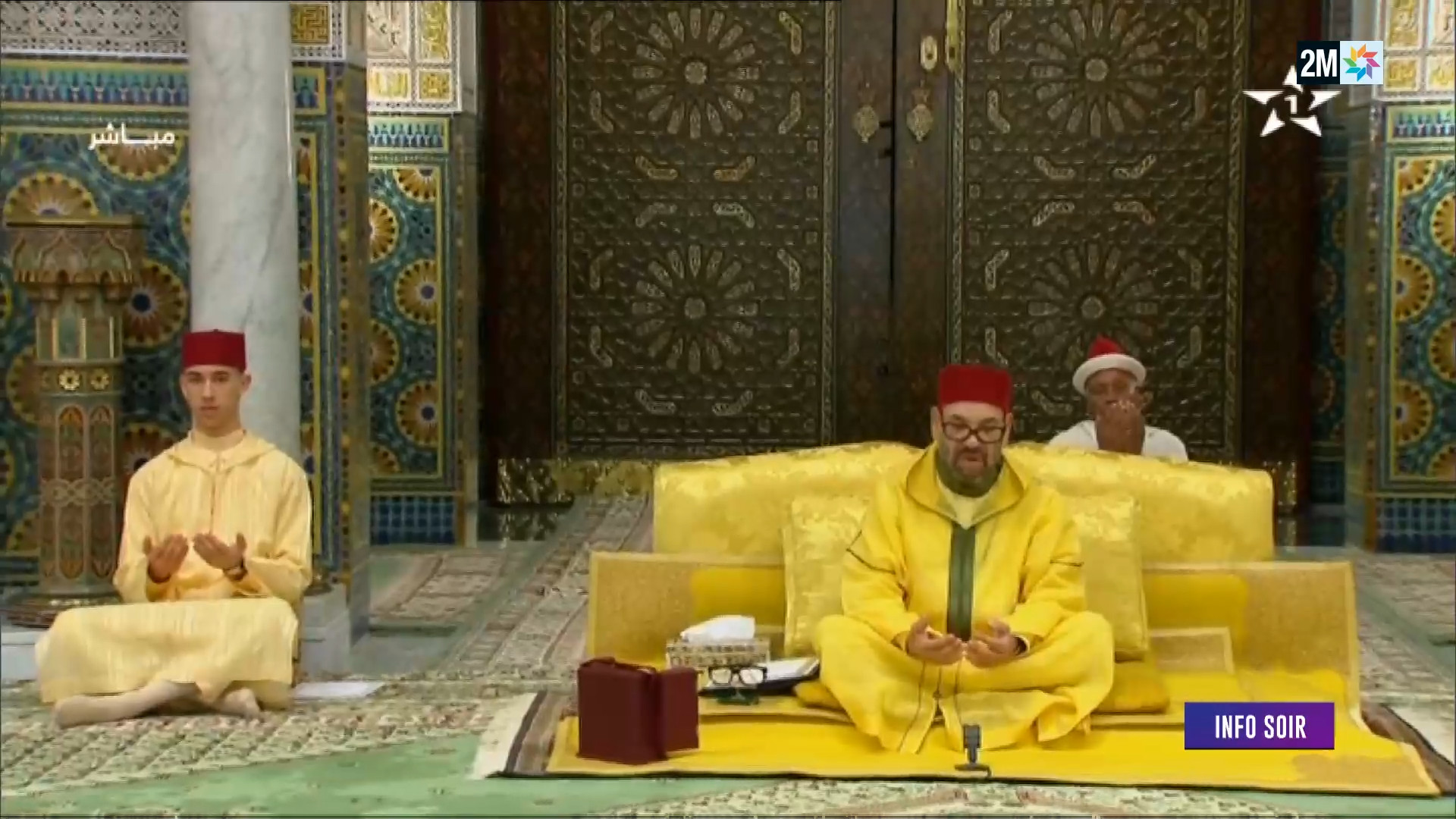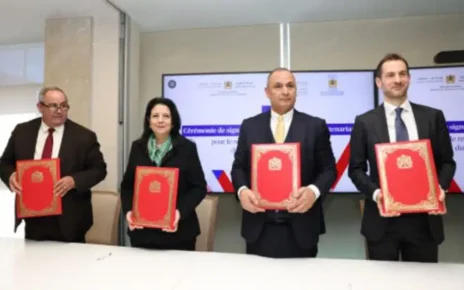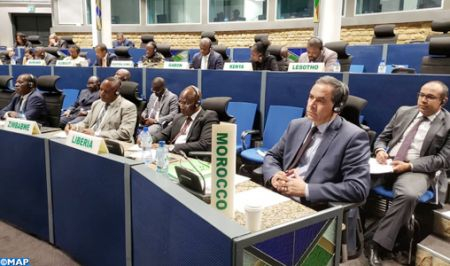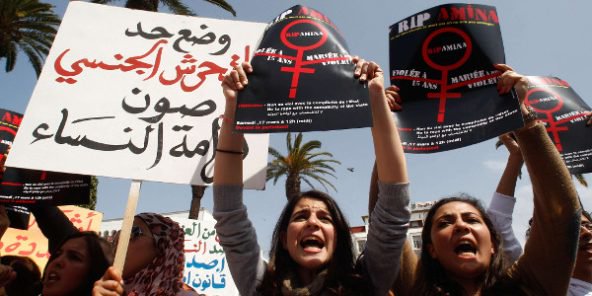King Mohammed VI, Commander of the Faithful, accompanied by Crown Prince Moulay El Hassan, Prince Moulay Rachid and Prince Moulay Ismail, chaired, on Sunday at the Royal Palace in Casablanca, the fifth religious lecture of the holy month of Ramadan that was delivered by Mufti of Tanzania Aboubakr Zoubeir Mbwana.
The lecture focused on the theme “The symbolism of the Commandery of the Faithful and its presence in the religious thought of the Ulema of East Africa: Tanzania as an example.”
The lecturer stressed that ‘the Commandery of the Faithful ensures the protection of religious ends and the preservation of the provisions of the Islamic Shariah, in accordance with the supreme values of Islam,” invoking the Quranic verse “O believers! Obey Allah, and obey the Messenger and those among you who are in command.”
The logical manifestation of this is the consensus of the sages that no human society can be established and no stability can be achieved without Man submitting to an Imam who takes care of his condition, manages his affairs, and guarantees his tranquility, the lecturer said, adding that the practical manifestation of this lies in the Commandery of the Faithful, adopted by Omar Ibn Khattab, and perpetuated after him by the caliphs of the Muslims.
He noted that Morocco has not deviated from adherence to the Great Imamat, to which Moroccans have been attached since the second century of the Hegira, during the Idrissid era, and this attachment has continued to be linked to the Alawi Kings, as evidenced by “your presidency of the institution of the Commandery of the Faithful, the preservation of its symbolism, and the care with which You discharge its obligations with sincerity and loyalty.”
“This is what makes You a unique example in the Muslim world, for it is one of the constants of the nation and a privilege for which God Almighty has distinguished You,” he added.
Regarding the presence of the Great Imamat in the religious thought of African countries, in terms of belief, behavior and loyalty, the Mufti of Tanzania reviewed three axes, including the doctrinal path, the behavioral path and the loyalist path.
He noted in this connection that the ulema of Africa, aware of the place of the Great Imamate in Islamic research and its importance in the study of belief, have given it primary importance and considered it a duty to be contemplated in the person of one who has been distinguished by this divine honor.
Given the fact that most of the African ulema belonged to the Acha’ari doctrine, the Commandery of the believers occupied a central place in their religious and theological thinking, explained the lecturer.
In this regard, Professor Abu Bakr Zoubeir Mbuana highlighted the religious, spiritual and civilizational links that bind Morocco to Africa, the Sheikhs of Sufi brotherhoods in different countries of the continent considering Imarat Al Mouminine as an institution to which they are proud to belong and for which they do not cease to raise prayers to the Almighty to fill with His blessings King Mohammed VI, who placed Africa at the heart of his concerns.
The majority of Muslims in Africa have links with the institution of Imarat Al Mouminine in Morocco, through scientific travel and through the intermediary of sheikhs of Sunni Sufism, he noted.
The Mufti also underlined the Sovereign’s efforts to fulfill his duty towards the African continent, efforts that are based, he said, “on the spiritual ties uniting Morocco and Africa, which are manifested by the strengthening of feelings of affection and loyalty towards the Commander of the Faithful.”
“Our pride as Africans in the institution of the Commandery of the Faithful and what it represents as a religious symbol in African countries in general, is part of the continuity of the attachment of our ancestors to this institution throughout the history of the Moroccan State”, he insisted, considering that it is a responsibility that has led several sub-Saharan regions and some African countries to perform the duty of allegiance, “bayaa”, to the Commander of the Faithful in Morocco.
In the same vein, the Mufti of Tanzania welcomed the initiatives launched by King Mohammed VI, through the institution of the Commandery of the Faithful, including the call to “correct the image of Islam in world public opinion, and the great interest that the Sovereign takes in the Bayt Mal Al-Quds Asharif Agency to provide aid and support to the Palestinian population in the Holy City, as well as the creation of the Mohammed VI Center for the Dialogue of Civilizations in Chile in 2004, as a link for civilizational communication between Morocco and Latin America.”
He also recalled the King’s initiative to create the Mohammed VI Foundation for African Ulema, which works to unify and coordinate the efforts of Muslim ulema, in Morocco and in the rest of African countries, to publicize, disseminate, and enshrine the values of tolerant Islam, highlighting the various scientific and cultural activities carried out by the institution.
Likewise, the lecturer hailed Morocco’s tradition to build mosques in different African countries, a tradition perpetuated by King Mohammed VI.
For the Mufti of Tanzania, the components of the religious system in Morocco are considered “the model and the beacon to follow.”
At the end of this fifth lecture of the holy month of Ramadan, King Mohammed VI was greeted by Yahya Istaquf, President of the Ulema Revival Association in Indonesia; Abdelhakim Al Anis, Chief Researcher at the Department of Islamic Affairs and Charitable Action in Dubai; Mohamed Moussaoui, President of the Union of Mosques of France; Libyan theologian Abdelaziz Al Karoui; Ismail Lutfi Jafakia, president of Fatoni University in Thailand; Aziz Hassou Fitch, president of the Mashaikha Islamia in Croatia; and Arif Abdallah Sakrad, president of the Muslim community in Timur.
The Sovereign was also greeted by presidents of the section of the Mohammed VI Foundation of African Ulema in Liberia, Cameroon, and Benin.



